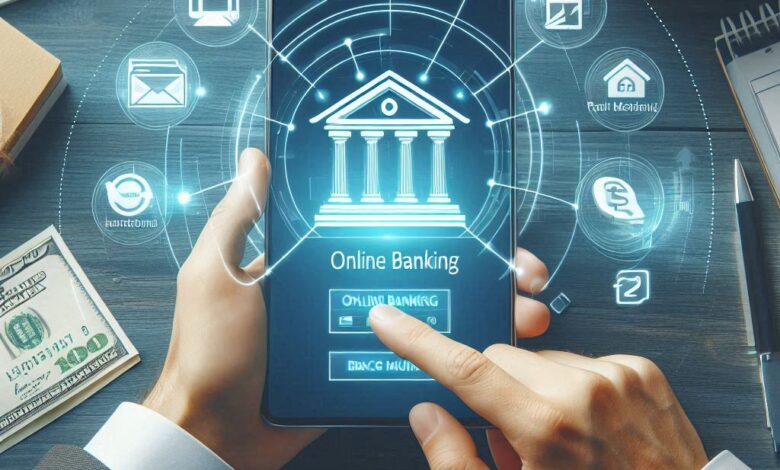Online Banking: Revolutionizing the Way We Handle Finances

Introduction
What is Online Banking?
Online banking, also known as internet banking, is a digital platform that allows individuals and businesses to conduct financial transactions over the internet. This convenient service has revolutionized the banking industry by providing customers with 24/7 access to their accounts and a variety of financial services.
Brief History of Online Banking
The concept of online banking dates back to the 1980s, with the advent of home banking services via videotex. However, it wasn’t until the mid-1990s, with the rise of the internet, that online banking became mainstream. Banks began offering online services to meet the growing demand for convenient and efficient banking solutions.
Advantages of Online Banking
Convenience and Accessibility
One of the primary benefits of online banking is the convenience it offers. Customers can access their bank accounts from anywhere in the world, at any time. Whether you’re at home, at work, or on vacation, you can manage your finances with just a few clicks.
Time-Saving Benefits
Gone are the days of waiting in long lines at the bank. With online banking, you can perform various transactions, such as transferring funds, paying bills, and checking your balance, in a matter of minutes. This time-saving feature is particularly beneficial for those with busy schedules.
Enhanced Security Features
Online banking platforms are equipped with advanced security measures to protect your financial information. These include encryption technologies, secure login processes, and continuous monitoring for suspicious activities. As a result, online banking can be safer than traditional banking in many cases.
Features of Online Banking
Account Management
Online banking allows you to manage your accounts efficiently. You can view your account balances, transaction history, and download statements with ease. This feature provides you with a clear and comprehensive overview of your finances.
Fund Transfers
Transferring money between accounts or to other individuals is straightforward with online banking. Whether it’s moving funds to a savings account or sending money to a friend, online banking makes the process quick and hassle-free.
Bill Payments
Paying bills has never been easier. Online banking enables you to set up automatic payments for recurring bills or make one-time payments. This ensures you never miss a payment deadline, helping you avoid late fees and maintain a good credit score.
Mobile Banking Apps
Most banks offer mobile banking apps, which bring the full suite of online banking services to your smartphone. These apps are user-friendly and provide the flexibility to manage your finances on the go.
How to Get Started with Online Banking
Choosing the Right Bank
Selecting a bank that offers robust online banking services is crucial. Consider factors such as user reviews, the range of services offered, and the bank’s reputation for security and customer service.
Setting Up Your Account
Once you’ve chosen a bank, setting up an online banking account is a straightforward process. You’ll need to provide personal information, such as your Social Security number, and set up login credentials. Some banks may require you to visit a branch to verify your identity.
Understanding Online Banking Platforms
Familiarize yourself with the bank’s online platform. Most banks offer tutorials or customer support to help you navigate their system. Understanding how to use the platform will ensure you can take full advantage of the services offered.
Security Measures in Online Banking
Encryption and Data Protection
Banks use encryption technologies to protect your data. This means that any information you send or receive online is converted into a code that is difficult for unauthorized parties to decipher.
Two-Factor Authentication
Two-factor authentication adds an extra layer of security by requiring two forms of identification to access your account. This could be something you know (a password) and something you have (a mobile device).
Safe Practices for Users
As a user, there are several practices you can adopt to enhance your security. These include regularly updating your passwords, avoiding public Wi-Fi when accessing your account, and being cautious of phishing scams.
Challenges of Online Banking
Technical Issues
Despite its many benefits, online banking is not without challenges. Technical issues, such as website downtime or slow internet connections, can hinder your ability to access your account.
Security Concerns
While online banking is generally secure, it is not immune to cyber threats. Hackers continuously develop new methods to breach security systems, making it essential for banks and users to stay vigilant.
Limited Physical Interaction
For some customers, the lack of face-to-face interaction can be a drawback. Traditional banking offers personal relationships with bank staff, which can be comforting and helpful in resolving issues.
Future Trends in Online Banking
Artificial Intelligence and Automation
The integration of artificial intelligence (AI) and automation is transforming online banking. AI can provide personalized financial advice, detect fraudulent activities, and automate routine tasks, enhancing the overall user experience.
Blockchain Technology
Blockchain technology promises to revolutionize online banking by providing a more secure and transparent way to conduct transactions. It can reduce the risk of fraud and streamline various banking processes.
Enhanced User Experience
Banks are continually improving their online platforms to offer a better user experience. This includes intuitive interfaces, personalized services, and faster transaction processing times.
Tips for Safe Online Banking
Regularly Update Passwords
Changing your passwords regularly can significantly enhance your online banking security. Use complex passwords that include a mix of letters, numbers, and special characters.
Monitor Your Accounts Frequently
Regularly checking your account activity helps you detect any unauthorized transactions early. If you notice any suspicious activity, report it to your bank immediately.
Use Secure Internet Connections
Always use a secure, private internet connection when accessing your online banking account. Public Wi-Fi networks are often less secure and can be targeted by hackers.
Comparison of Online Banking vs Traditional Banking
Speed and Efficiency
Online banking offers unmatched speed and efficiency. Transactions that might take days through traditional banking can often be completed instantly online.
Accessibility
With online banking, you have access to your account 24/7, whereas traditional banking hours are limited. This flexibility is a significant advantage for many customers.
Cost Implications
Online banking can be more cost-effective than traditional banking. Many banks offer lower fees for online services, and you can save on transportation costs by not needing to visit a branch.
Popular Online Banking Platforms
Overview of Major Banks
Major banks like Chase, Bank of America, and Wells Fargo offer comprehensive online banking services. Each has its own unique features and benefits.
Features Comparison
When choosing an online banking platform, compare the features offered by different banks. Look for services such as mobile check deposit, budgeting tools, and customer support availability.
User Reviews
User reviews can provide valuable insights into the pros and cons of different online banking platforms. Pay attention to feedback on usability, security, and customer service.
The Impact of Online Banking on the Financial Industry
Shift in Consumer Behavior
Online banking has significantly changed how consumers manage their finances. There is a growing preference for digital banking solutions over traditional methods.
Influence on Brick-and-Mortar Banks
The rise of online banking has led to a decline in the use of physical bank branches. Many banks are downsizing their branch networks and investing more in digital infrastructure.
Role in Financial Inclusion
Online banking has the potential to enhance financial inclusion by providing banking services to underserved populations. People in remote areas can access banking services without needing to visit a branch.
Regulatory Aspects of Online Banking
Legal Framework
Online banking is governed by a complex legal framework that varies by country. Regulations are in place to protect consumers and ensure the security of online financial transactions.
Compliance Requirements
Banks must comply with various regulations, including data protection laws and anti-money laundering (AML) requirements. Compliance ensures the integrity and security of online banking services.
Consumer Protection
Regulators work to protect consumers from fraud and other risks associated with online banking. This includes setting standards for security practices and providing mechanisms for dispute resolution.
Case Studies of Successful Online Banking Adoption
Examples from Different Countries
Countries like Sweden, the Netherlands, and South Korea have successfully embraced online banking. Their experiences offer valuable lessons in terms of adoption strategies and overcoming challenges.
Key Success Factors
Key factors for successful online banking adoption include robust infrastructure, user-friendly platforms, and effective marketing strategies. Ensuring customer trust is also crucial.
Lessons Learned
Lessons learned from these case studies emphasize the importance of continuous innovation, customer education, and adapting to changing technological landscapes.
Conclusion
Recap of Online Banking Benefits
Online banking offers numerous benefits, including convenience, time savings, and enhanced security. It has transformed the way we manage our finances, making banking more accessible and efficient.
Future Outlook
The future of online banking looks promising, with advancements in AI, blockchain, and user experience improvements. As technology evolves, online banking will continue to grow and offer even more innovative solutions.
Final Thoughts
Embracing online banking can significantly improve your financial management. By staying informed about the latest trends and adopting safe practices, you can enjoy the many advantages of this digital banking revolution.
Frequently Asked Questions (FAQs)
How secure is online banking?
Online banking is generally secure, thanks to advanced encryption technologies, two-factor authentication, and continuous monitoring for suspicious activities. However, it’s essential to follow safe practices to protect your information.
What to do if I forget my online banking password?
If you forget your password, most banks offer a password reset option through their online platform or mobile app. You may need to answer security questions or use two-factor authentication to verify your identity.
Can I access my account from multiple devices?
Yes, you can access your online banking account from multiple devices, such as your computer, smartphone, or tablet. Ensure that each device is secure and uses up-to-date security software.
What should I do if I notice suspicious activity?
If you notice any suspicious activity on your account, contact your bank immediately. Most banks have a dedicated fraud detection team that can assist you in resolving the issue.
How do online banking apps enhance user experience?
Online banking apps enhance user experience by providing a convenient and user-friendly interface. They offer features like mobile check deposit, real-time notifications, and easy access to account information, making banking more accessible on the go.



